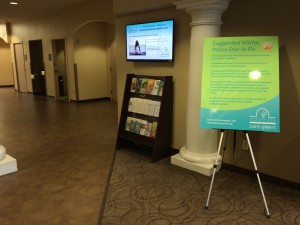
BERLIN – Last year, staff at Atlantic General Hospital saw 20 cases of the flu.
This year, halfway through flu season, that number has already reached 241.
Twenty-two flu patients have been admitted to the hospital.
“In all my years here, this is the first time we’ve admitted that many patients because of the flu,” said Michaelann Frate, the hospital’s director of infection control.
Mirroring the trend reported at the state and national level, local hospitals are seeing an increase in flu cases. With the end of flu season still months away, Atlantic General and Peninsula Regional Medical Center have both already seen more cases this year than in all of last year. Children and seniors have been the most affected.
Although the most recent Atlantic General statistics show a decrease in confirmed cases within the past week, Frate says it’s too early to say if that will continue.
“I don’t know what to expect,” she said.
Flu season varies each year. While it typically begins in December, it may taper out as early as March. Other years, Frate said, it lasts as late as June.
“It hit us hard in the beginning of the season,” Frate said. “Maybe we can hope for an early end.”
She believes this year’s rise in flu cases is attributable to a strain of the virus that mutated early on. Although the flu vaccine is designed to prevent three to five strains of the flu, if one of those strains mutates the vaccine becomes less effective.
“It seems to be more virulent than other mutations in the past,” Frate said. “People have been quite sick.”
She added that the flu vaccine itself was created each year based on researchers’ “best guess” as to what strains of the virus were most likely to appear. According to the Centers for Disease Control, this year’s vaccine is 23 percent effective.
Frate says that while it’s less helpful in preventing the virus than it has been in the past, it’s still worth getting.
“That’s 23 percent more than if you didn’t take it,” she said.
Frate, who’s been at Atlantic General for 15 years, pointed out that in spite of her profession she had not had the flu since she’d started getting vaccinated.
“I think over the years you do build up immunities,” she said.
For those who haven’t yet gotten vaccinated this season, Frate says it’s not too late. Although she recommends getting it as soon as it becomes available in the fall, the vaccine is good for a year and is still available at most pharmacies. Because the flu could remain prevalent all spring, Frate says it’s worth getting the shot.
She added, however, that it takes two weeks to begin working. She believes the “old wives tale” that getting the vaccine would give a person the flu probably started because someone wasn’t aware of the two weeks it took for the vaccine to have an effect.
Frate stressed that it was especially important for the elderly and those with chronic conditions to get the vaccine because they were more susceptible to the virus than most people. A person with a heart or lung condition, for example, is more likely to get the flu.
“It lowers your chances of fighting it off,” she said.
In an effort to prevent the spread of the virus, like many hospitals Atlantic General is limiting visitors to the facility. Frate said children and those with upper respiratory illnesses were being asked not to visit patients (except in end-of-life situations) for the time being.
In Wicomico County, Peninsula Regional Medical Center — where there have been 138 confirmed flu cases — has also modified its visitation policy. The elderly and people with chronic conditions are advised not to visit patients while children are not allowed to visit patients (except in end-of-life situations). Only two adults are permitted to visit in the labor and delivery department and pregnant women are asked not to visit the hospital unless they’re seeking medical treatment.
“We understand the inconvenience this may cause some people, but as a healthcare institution, we need to make sure that we ensure the health of our patients, the visiting public and their families as best we can during this flu season,” said Karen Mihalik, the hospital’s infection preventionist, in a news release. “It’s also absolutely necessary to protect a healthcare team that needs to be here providing the care others will seek form us this flu season.”
For information on where to get vaccinated for the flu area residents should contact their primary care physician or their local health department. Worcester County residents can call 410-632-1100.
